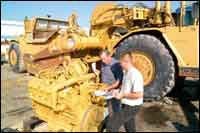Clean-Engine Replacements Hone Fleet's Competitive Edge
Question: Why participate in a voluntary engine-retrofit program if it forces you to do major work on more machines in a year than planned?
Answer: "In prior years, we were offered a job or two per year on the kind of project that requires lower machine emissions," says Sandi Capel, general manager of Coburn Equipment. "Since we started letting people know three months ago that we would have repowered tractors, we've gotten three offers to work on projects where the machines have to run clean."
Coburn is a player in California's specialized earthmoving-equipment rental business. The company earns its living hiring out scrapers with operators to general contractors that need a mountain moved. The state of California recently intensified its push to move construction-project owners toward limiting total air pollution emitted from these big digs. The number of projects being let that require machines with minimum exhaust emissions is growing.
The state offers a diesel-retrofit program as part of its clean-air push. Government grants pay equipment owners to replace highly polluting older engines with clean-burning new engines rather than to rebuild them. Using what Capel says is a very logical system, the retrofit-program administrators estimate rebuild cost based on the equipment specifications, dealers' parts estimates, and the users' utilization history. A grant is issued to pay the difference between the rebuild cost and the total cost of replacing the old smoker with a new engine. For example, if a replacement engine costs $170,000, and your rebuild-cost estimate is $50,000, the program pays $120,000 toward the repower.
Coburn saw it as a two-fold opportunity. Participating in the program improves the firm's ability to work on projects that limit diesel emissions, and it would give Coburn new-engine reliability for the same cost as engine rebuilds the company would inevitably undertake.
"Here in Southern California, we move huge volumes of earth. For example, we completed one project where we moved 50 million yards of dirt," says Capel. "Consequently, there's a huge number of machines in this part of the world. There are so many rental companies and so much equipment that we're all basically charging the same prices. Availability, or uptime, is our only advantage."
So Coburn is replacing 20 engines this year. The firm's own mechanics will do all of the work. Wiring is the biggest technical challenge. Installing Cat 3412 and 3408 HEUII engines into 20-year-old frames doubles the amount of wiring on board.
"But we're also taking care of all the major preventive maintenance while the machine is in here—welding up cracks and that sort of thing," says Mike Bowman, Coburn's equipment manager. "We're not only reducing our emissions, but we're going to have less problems with our fleet. We're taking eight tractors and making them like new again.
"We normally get 12,000 to 15,000 hours on a new engine, where a rebuilt engine is only going to last 8,000 or 10,000 hours," says Bowman. "We expect these machines—with up to 45,000 frame hours—to go out and work for at least seven or eight years without any major problems."
Bowman developed a standard parts list that will ensure all the necessary sensors and other materials are in hand. He identified cab and bulkhead modifications to adapt 20th Century machines to a 21st Century electronic system, and learned the programming tips to make sure the two computers—one on each engine—work together.
Installation speed is important to making sure the repower program doesn't blunt the edge of Coburn's availability advantage in 2003. Because of the intensity of competition, Capel considers leading the repower charge crucial to the decision's success.
"This area hasn't been affected by the national economy at all—not for three or four years," she says. "Things are happening so fast out here, it's like the Gold Rush."
In that kind of business environment, serious competitors need to invest in advantages if they hope to have a shot at long-term viability.
"The repowers mean a lot of capital cash going out right now, and it was definitely a financial issue that we had to prepare for," Capel says. "We knew we would need better cash flow during this time frame, even though we would be pulling machines out of the fleet and they would not be generating cash flow."
They're covering the cash drain by foregoing some elective expenses. It's the kind of calculated risk that the company has been making in stages for the last 10 years, when Ray Coburn anticipated the state's move to limiting emissions from projects. It was during the early 1990s when he started gearing up for the change by replacing B-model scrapers that would normally have been rebuilt with cleaner-burning E models.
"This is the way of the future," says Coburn, the company's owner. "With all the air-quality standards coming out limiting smoke, there are jobs you won't be able to get if you don't have clean engines."



